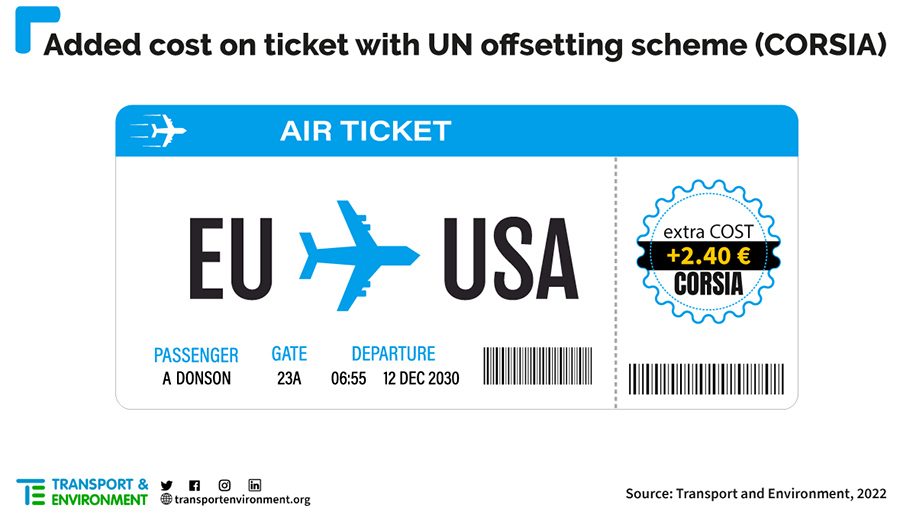
Environmental group Transport and Environment has released new research which it says shows that airline offset schemes are ‘greenwashing’.
The new analysis looks at the offsets offered through the UN International Civil Aviation Organisation (ICAO). These add, on average, just €2.40 to the price of a one-way long-haul flight according the research.
ICAO is the UN body tasked with cutting global aircraft emissions. It uses a system of purchasing emissions offsets that “has so far proven totally ineffective for reducing aviation’s climate impact”
New analysis by Transport and Environment shows that on a flight from Europe to the United States, on average passengers would have to pay as little as €2.40 to offset their carbon emissions in 2030. On a flight to the Middle East, the added cost per passenger would be €1.40; to China, €3.50.
Such amounts are inadequate when considering the cost of decarbonising the aviation industry, Transport and Environment says.
Environmental groups have for years challenged the use of offsetting as a means to reduce aircraft emissions.
Airline carbon offset scheme is the worst option for reducing aviation’s emissions – EU analysis
ICAO is promoting a scheme called CORSIA (the Carbon Offsetting and Reduction Scheme for International Aviation).
CORSIA relies on airlines paying to offset any growth in emissions above a certain baseline. Originally this baseline was to be the average of emissions from 2019 to 2020. As a result of the Covid-19 pandemic, when flights, and therefore emissions, were much lower, this would have meant a much lower baseline, and so ICAO changed it to 2019 alone. If this weaker 2019 baseline remains in place after the CORSIA pilot phase which runs from 2021-2023, the cost per passenger for flights to the US is even smaller – €0.80 in 2030.
The total cost for all airlines operating flights from the European Economic Area (EEA) to the US to offset their emissions under CORSIA is expected to be €118 million in 2030, representing only 0.4 per cent of their total operating costs in 2030.
For those carriers operating flights from the EEA to the Middle East, purchasing offsets would cost €40.3 million in 2030 – a figure representing 0.3 per cent of total operating costs.

Jo Dardenne, aviation director at Transport and Environment, says: “Offsetting is a climate fraud, perpetuated on unsuspecting passengers by an industry resisting real climate action. Paying €2 to fly ‘guilt-free’ to New York is a climate absurdity. Having transport ministries continue to come to the negotiating table with offsetting as their golden solution is unacceptable. CORSIA is a non-starter for our heating planet. Whatever ICAO decides during its Assembly, it will never rise to the challenge of aviation’s climate problem.”
The new research estimates that for all flights from the European Economic Area (EEA) to the US in 2030, CORSIA offsets – if effective – would represent a mere 8.6 million tonnes of CO2. Under current rates of predicted growth of air traffic, all flights from the EEA to the US will contribute 23.5 million tonnes of CO2 poured into the atmosphere by 2030. CORSIA offsets would cover only 36.7 per cent of emissions at the start of the next decade.
Transport and Environment says that the polluter pays principle must be used to incentivise airlines to reduce their carbon footprint because the more expensive it gets to pollute, the quicker the shift can be made towards sustainable alternatives. The EU has implemented such a mechanism with the carbon market for aviation (EU ETS), where airlines need to pay for their emissions, but only intra-EEA flights are currently covered by the EU ETS.
The study shows that if international flights were included in the EU-ETS, then on an EEA-US flight, the average added cost per passenger in 2030 would be €48.10 and €69.50 for a flight to China. For carriers operating the flights to those regions, just over 7 per cent of operating costs would be needed for the purchase of carbon permits. The revenues raised should then be reinvested into sustainable solutions and cleaner fuels, like e-kerosene and green hydrogen, says Transport and Environment.












